IPF Webinar on Condition of Muslims in Independent India
Total Views |
IPF WEBINAR
ON
CONDITION OF MUSLIMS IN INDEPENDENT INDIA
August 7, 2021
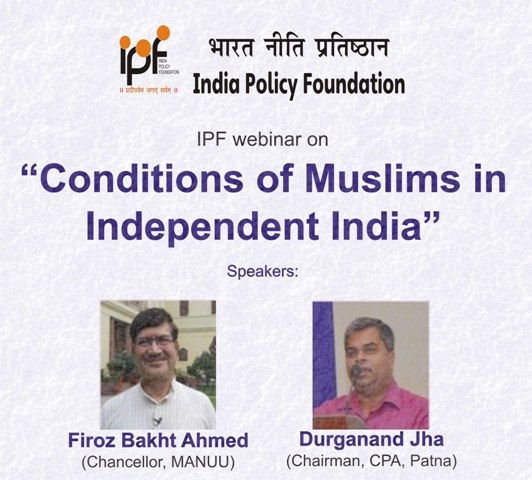
Speakers:
Firoz Bakht Ahmed (Chancellor, MANUU)
Durganand Jha (Chairman, CPA, Patna)
Er. Mohammad Afzal (Social Worker)
Moderator:
Dr Kuldeep Ratnoo, Director, India Policy Foundation
Dr Kuldeep Ratnoo:
Good evening!
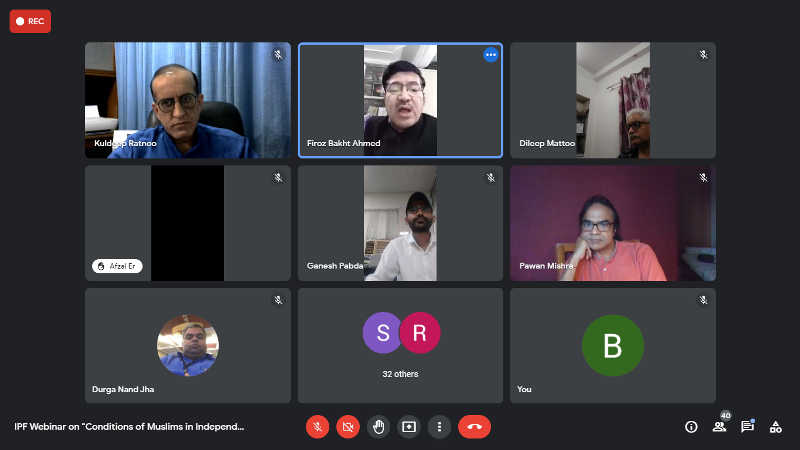
I extend a hearty welcome to everyone to India Policy Foundation’s webinar. The topic of discussion today has been widely debated and we often hear two extreme points of view when it comes to the economic situation of Muslims in the country. One side is of the opinion that Muslims are not getting opportunities in higher education, government jobs etc in ratio of their population. They also argue that majority of Muslims live below poverty line in the country and do not have access to nutrition. While the other section argues that Muslims have enough resources and with increasing population, they have more area under their control and also have greater political influence. This section also points towards the appeasement politics that is resorted to by many political parties.
We will get to the depth of this issue and analyse it in an objective manner. We will find out if there is backwardness in the Muslim community as is being portrayed.
We know that in 2005, the Manmohan Singh-led UP government had formed the Sachar Committee. The Committee in its report stated thatthe conditionof Indian Muslims was below that of Scheduled Castes and Scheduled Tribes. As per the recommendations of the Committee, the government had taken various measures for the welfare of Muslims including an increase in the budgetary provision. The current Narendra Modi-led government is also following the recommendations given by the Sachar Committee and has been taking various measures for the welfare of the Muslim community. The government has ensured that Muslims have access to government jobs, coaching classes etc. To give scholarships to eligible candidates from the community, the central government and several state governments have increased their budgetary allocation. Some of the state governments have also declared monthly salaries to be paid to Muslim clerics. This issue has many aspects and we need to analyse those in anobjective manner.
The first speaker today is Shri Firoz Bakth Ahmed who is an educationist. Presently, he is the Chancellor of Maulana Azad National Urdu University. He is a columnist and is regularlyseen in television debates and various seminars.
Our next speaker is Shri Durganand Jha. He is the Executive Chairman of Centre of Policy Analysis, Patna. His field of study and research has mainly been economics. He was also associated with the erstwhile Planning Commission of India. For the past few years, he has beenstudying the economic condition of Muslims in the country. He has been inregular touch with many Muslim intellectuals, political workers etc to understand the condition of the community. Two years ago, hepublished the India Minority Report which analyses the socio-economic condition of Muslims in India. It is notable for a number of reasons. The conclusion that he has given in the report which is based on the data he has collected should be read by everyone at the helm of policy making. It will help them understand the reality about the Muslim community better.
Our third speaker is Er. Mohammad Afzal. He is a qualified engineer and a social and political activist.He has taken part in several socio-political movements and was also associated with Jan Sangh. He is also a member of the Muslim Rashtriya Manch.
Once again hearty welcome to all of you!Now I request Shri Firoz Bakht Ahmed to share his views.
Firoz Bakht Ahmed:
I would like to thank Kuldeep Ratnooji and India Policy Foundation for giving me opportunity to speak on today’s topic. The condition of Muslims in India is a very sensitive topic. Whether Hindus, Sikhs or Muslims, we are all one. Religion isa strictly personal issue. We are all Indians first. We are all brothers and sisters and belong to one single family, which is Hindustan. What happens often is that talks do not transform into actions because of which we need to organise talks like that of today. The work that India Policy Foundation has done in this field is commendable. Though it is a difficult topic, it is important to have discussions on this. Muslims have been living in India for many years. I keep listening to our honourable Sarsanghchalak Shri Mohan Bhagwat ji and I respect him a lot. He said in a meeting that was held in Ghaziabad that there is no Hindu or Muslim, we are all one, our DNA is the same and our roots are the same.
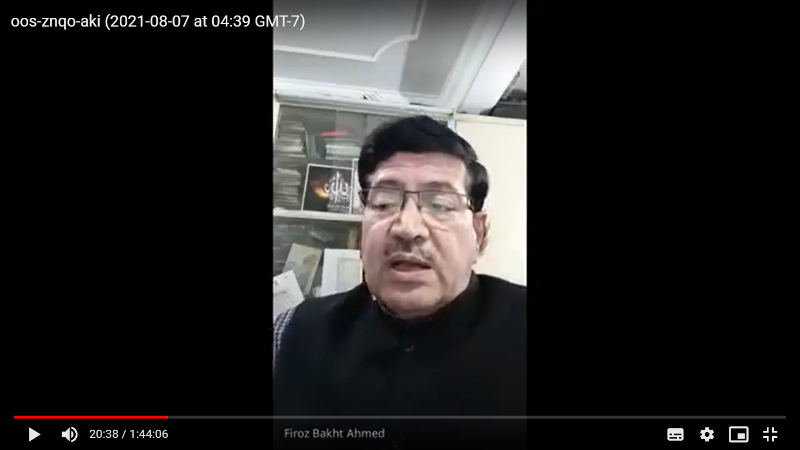
When speaking about Muslims, it is often said that they are backward. Personally, when we think about the last 70-75 years, I do not feel that Muslims are as backward as they are portrayed in the Sachar Committee report. Muslims are disadvantaged the same way a poor Hindu, Christian or Sikh is disadvantaged. I do not think that Muslims are extremely backward. I keep hearing that the ratio of Muslims in the civil services, army and in the fields of medicine and law is less. How will the ratio increase if you don’t go to schools and sit in exams? Muslims will have to think beyond reservations and start believing in their own merit and forge ahead.
I had filed a PIL asking why Jamia Milia Islamia is being declared as a minority institution. Maulana Abdul Kalam Azad has said in 1940 that Muslims are not a minority, they are the second majority. We have had Presidents, Vice Presidents and there have been several ministers and cabinet secretaries from the Muslim community. Even if Muslims attain their education from Madrassas, they don’t remain backward. It is a false allegation that there is discrimination against Muslims. Nowhere in the country is there discrimination against the community. Maybe in countries like the US and UK, there may be discrimination against Muslims. But I can vouch for the fact that it does not happen in India. For the meritorious Muslim kids, the Ministry of Minority Affairs ensures that they get the opportunities that they deserve. If you look at sari weaving in India, then you will find that most of the workers are Muslim women. The idols for Durga pooja in West Bengal, Odisha, Delhi and Bihar are mostly sculpted by Muslims. Around 80-90 per cent Muslims are in this trade. Those Muslims who work hard to achieve their goals in life are given due credit everywhere. India is the best country for Muslims.
The explorer Ibn Battuta after travelling to countries like Saudi Arabia, Egypt, Iran, Iraq, Afghanistan, Malaysia etc. came to the conclusion that it is in India that Muslims are well off and have a high standard of living. I completely believe in this observation. It is indeed disheartening to see intellectuals and clerics spewing venom against the country. We should instead be encouraging children to attend schools as education will eventually help themmarch ahead. I strongly believe that in the last 75 years, the condition of Muslims in the country has improved in a drastic manner. The ratio may not be equal when compared to the Hindus and Sikhs. But it is in direct proportion to the amount of hard work that one puts in to get ahead in life.
When I filed the PIL against Jamia Milia Islamia University in Delhi High Court, the then minority minister Abdul Rahman Antulay invited me to his home and asked me to withdraw the case and said it is a minority institution. Then I asked him a question. I asked him whether he made use of reservations to go to London and become a barrister or to become the minister. He replied that he had never made use of reservations to achieve anything. I told him to teach the younger generation of this country to look beyond reservations and believe in achieving their goals through sheer merit. A few years ago, somebody had filed a petition demanding five per cent reservation. Nobody should rely on reservation given on the basis of religion. I agree that we need to give reservations for the economically disadvantaged. It should include all religions and reservations should reach the right person. I strongly believe that reservations should not be given on the basis of religion.
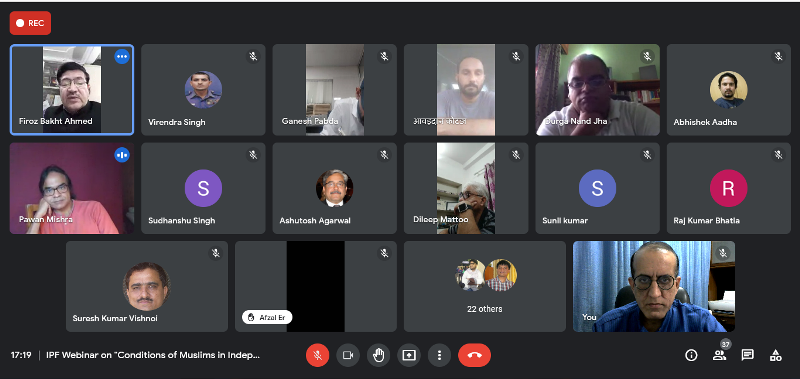
I will not go into the history of Muslims that dates back to 800 years. There were succession struggles in the various dynasties that ruled the country. I believe that if the Muslim rulers had built educational institutions instead of monuments, they would not have met with the fate they did. Even in Madrassas along with religious education, it is important to include Hindi, English, Scienceetc. Till the time it is not done, real progress will not happen in the community. It is important to do hard work to forge ahead.
I would like to thank our prime minster Narendra Modi who took numerous measures to ensure the welfare of the Muslim community. We can divide the Muslim community into three phases. The first was before 1857 during the time of Bahadur Shah Zafar when Hindus and Muslims used to live in harmony. The second phase lasts till 1947 and the third phase starts after independence. During the first phase,Muslims use to shout slogans like Bharat Mata ki Jai, Hindustan Zindabad and Vande Mataram. As a devout Muslim who offers Namaz five times a day, I ask what is wrong in shouting these slogans now? A Muslim leader from Hyderabad declared that he will slit his throat but will not say Vande Mataram. How can someone who lives on Indian soil and who enjoys all the benefits of being an Indian say this? When I take part in activities of other religions, I enjoy them. At the same time, my belief in my religion also gets strengthened.
I will take a turn now and focus on Article 370. Earlier it looked like another nation was being created on the borders of Pakistan. It is our country and the land that is being encroached upon will eventually belong to us as it is part of the nation. Scrapping of Article 370 was the right step and credit should go to the Prime Minister and his team which includes Home Minister Amit Shah and National Security Adviser Ajith Doval. The second point I want to make is that the decision on Ram Mandir was apt. Long ago, I had written in Times of India that Ramchandra is God for 150 crore Hindus. Just like how Allah is our God and he has an abode in Mecca Medina, Hindus should also have a sacred place for worship. Muslims have accepted this decision whole heatedly and Hindus have also been very modest about this decision. Those who played spoilsport here are the people who filed for review petition.
To conclude, I would like to say that all our Muslim brethren should be happy and grateful that they live in a country like India. A country like this does not exist anywhere in the world and we should respect what we have. We should stop thinking that BJP, RSS and the prime minister are against the community. This is absolutely false. We have not had a leader as dedicated, loyal and committed as Modi ji and I do not think India will see a leader like him in the near future. Before being Hindus or Muslims, we are all humans first. And above all, we are all Indians.
Thank you so much.
Dr Kuldeep Ratnoo
Thank you. You have said that the issue is not about backwardness, it is about priorities. I request Durganandji to throw light on the condition of Muslims in the country through statistics and ground realities. There are no two opinions on the fact that education is lacking in Muslims when compared to other minority communities like Jains, Sikhs and Christians. Their economic conditions also cannot be compared to that of Parsis or Jains. Considering their population, what is the level of backwardness in Muslims and what are the reasons for it? Please give an objective view of the situation.
Shri Durganand Jha
I would like to start with a historical event. Printing press was banned in Ottoman Empire for more than 300 years. Even the Quran used to be printed in Rome and sold in Ottoman Empire. Another incident that happened in Europe is how Galileo faced persecution by the church for his theory of heliocentrism but still had the European society stand by him. In Ottoman Empire, the entire society supported the rulers and said that printing should be banned. The two approaches to scientific inventions are telling.
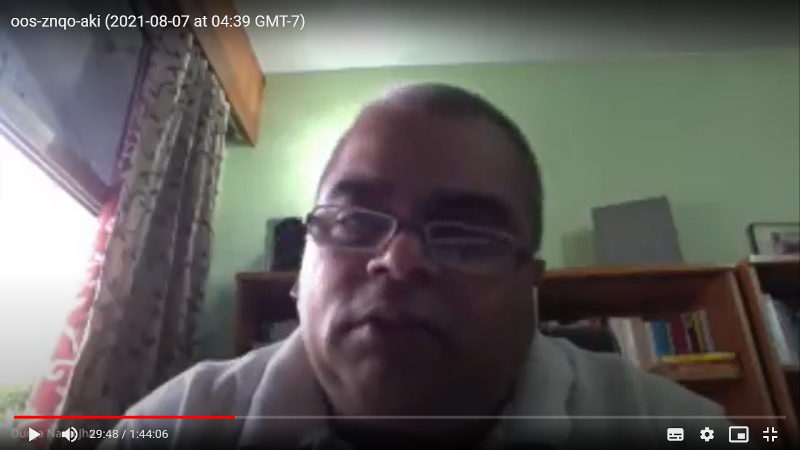
There have been numerous debates about the economic condition of Muslims being bad in India and the community being backward. We need to understand the reasons why this is so. In 1951, the population of Muslims in India was 32 million. It was below 10 per cent. And the population of Hindus was around 84 per cent. In 2011 census, the percentage of Muslims was 14.3 per cent while that of Hindus was 79.8 per cent. If we take 1951 as the base year and compare it to 2011, then the resource dependency ratio for Hindus becomes 3.15 per unitresource while for Muslims it is 5.05 per unit resource. This means, if there was no change in economic conditions of Hindus and Muslims, still 38 per cent of the Muslims became poorer. Why? Because their comparative population growth rate was higher. So, while per unit resource dependency was 3.15for Hindus, it increased to 5.05 for Muslims.
The second thing that needs to be understood is how is the development of a community measured? First is the literacy level and second is the work participation rate. Now if you see, the literacy rate of Muslims especially with respect to women is 48 per cent. This means that in Muslim community, the number of girls attending schools are less when compared to other communities. If you take the work participation rate, then male participation is almost at par with the national average. But when you count the participation of women too, then the rate drastically goes down. So, this means that Muslim women are not part of the workforce which is brining down the overall work participation of the community.
So, I met the minority affairs minister when this government was formed and said that it is necessary to look at three criteria if the condition of Muslims have to be improved in the country. The first is that schools for girls should be opened in areas where Muslims are in large numbers. If you open schools at faraway places, then it is unlikely that girls will be sent to study. They will eventually be sent to the nearby madrassas which would mean that they will never have access to proper education. The next is to link madrassas with skill training. Religious education is non-productive education. The madrassas that are opened in Bihar and UP have become ‘all India suppliers of maulanas.’ If these institutions are linked to ITI, students will be able to learn some skills and do something on their own and become financially independent.
The Sachar Committee report had stated that the conditions of Muslims in India are worse than SC/STs. This is untrue. In the 68th round of National Consumption Expenditure Survey, if you look at it from religious lines then the consumption expenditure of Muslims is less. But if you look atthe household rates, then there is not much of a difference in consumptions among Muslims and the national average. There are predominantly two things that need to be done to improve the condition of Muslims – the first is to reduce the population growth rate and the second is to send Muslim girls to schools. Development is definitely taking place among Muslims but when compared to the other communities, it is backward.
As far as the question of inclusion is concerned, I don’t think there are any areas or positions in India where Muslims have not been given opportunities. Recently, I was looking at a study on comparative citizen rights. I found that Indian Muslims have more rights when compared to Muslims in other countries. These rights are there for everyone and not just Muslims. In addition to these, there are also special rights. In other countries, Muslims are still fighting for equal rights. In most of the European countries you can see that the rights of Muslims are restricted often through different excuses like ensuring of human rights or animal rights etc. In India, there are no such restrictions. So, there is nothing called backwardness and discrimination in India that the community is suffering from.
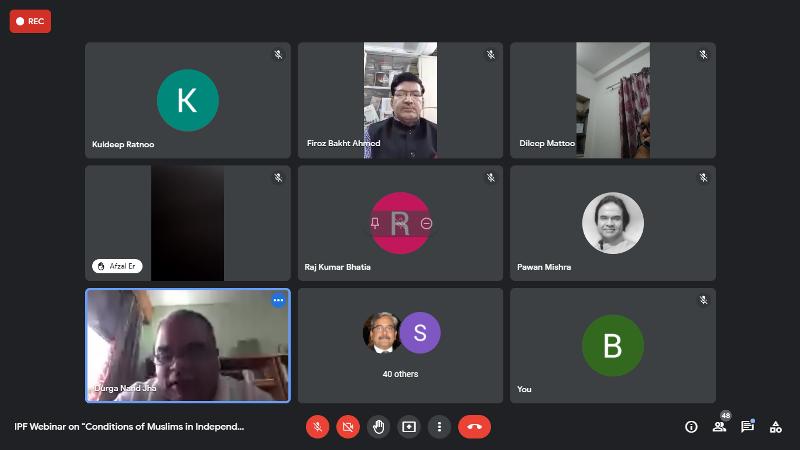
Muslims are hardworking and their labour is of good quality. The only problem is that they are unable to provide education to all. The main reason for this is the rising population. How is it possible to feed big families without the children going to work? Poverty is essentially lack of skill to earn. Not having money is only an end result of not having the necessary skills to earn a living. Another reason that needs to be noted is that 53 per cent of the Muslim population is in the states of West Bengal, Uttar Pradesh, Bihar and Assam. All these states are already backward which means that the people in these states are also backward as they don’t earn as much as people in other states. The population growth is one of the biggest problems of the Muslim community. Population growth rate often increases in areas where there is more poverty and the overall financial condition is not good. In Kerala, the literacy rate is nearly 100 per cent and Muslims there are well off. Yet, their population growth rate is more. Most of the time the growing population rate also leads to population tensions.
I personally don’t believe that Muslims are economically backward. Educationally, yes, they are backward but economically, they are in similar position as any other person belonging to that particular area that we are considering.
The third reason for backwardness is internal. If you don’t allow your women to work and progress, then there will be backwardness. Modi ji banned triple talaq. The one good outcome of this step is that women who were unable to play positive roles in their families before thisare able to do so now. A development-oriented atmosphere is being created in families now. The schemes for minorities where Muslims are the major beneficiaries are more in number even when compared to the schemes for SCs and STs. Despite these measures, if the community is not growing, then it needs serious introspection. And this has to come from within the community. It is wrong to keep on blaming the government. These are the points that I wanted to put forth.
Dr Kuldeep Ratnoo:
Thank you for sharing your views. You have said that there is backwardness in the Muslim community but the consumption rates of Muslims are less because the unit of measurement is per person instead of per household. The second reason that you pointed out is the lack of participation of women in the workforce. This is because education is not as widespread in the Muslim community when compared to the other communities. But wherever there has been a level playing field like in sports, art or culture, Muslims have done extremely well. And Hindus as well as all other communities have supported them. In Hockey, we had ZafarIqbal and Mohammed Shahid, in cricket we had Zaheer Khan and we have had numerous artists in the field of films, art and music. Those who are talented have flourished and have also made the country proud globally. There is no question of discrimination.
But yes, the ratio of Muslims in government jobs and the armed forces are less. The question is how many of them are applying and preparing hard for competitive exams? It is true that religious education has been given importance over formal education because of which the community has not been able to realise its optimum potential. Their opportunities will be less as they won’t have the foundation needed for professional jobs.
Shri Durganand Jha
The representation of Muslim community in the government may be less when compared to their population growth but they are doing very well in the private sector. Take the case of Azim Premji and others who are at the top of the sector.
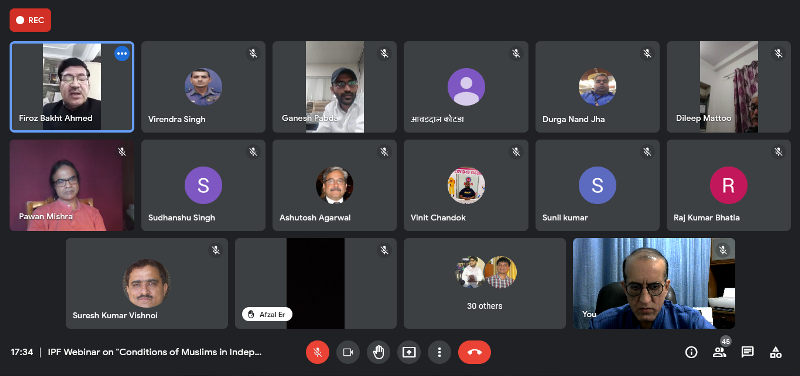
Sachar Committee has given a wronginformation. It said that only four per cent of the Muslim population goes to Madrassas. But the 2013 Minority Education Report of the Government of India said that 10 per cent goes to Madrassas and in 65 districts, 28 per cent Muslim kids go to Madrassas.
Q&A session
Mujahid Nafees: The issues discussed today were pertinent and it is important to keep having such discussions. I agree with most of the points that have been put forth. The differences I have are ideological. The first point I want to talk about is discrimination. If a woman joins an office full of men, then only she will be able to understand what it feels to be in that place and how she is being viewed by others. Same way, only Muslims will be able to put forth how they are discriminated against or judged. I am the convenor of Minority Coordination Committee in Gujarat. So, I will focus on Gujarat.
When you say Muslims are less educated, you also need to understand that there are no schools that they can go to. How can we expect four lakh students to go to one school? In a situation like this, they are forced to go to Madrasas. The first responsibility lies with the government in making educational opportunities available for the students. After that it is the responsibility of society to ensure that the students are getting education. If you see the retention rate in Gujarat schools, then more than half of the students drop out in the first month itself. You will see that in areas where Muslims are more in number, there are no schools which offer classes till 12 standard. For the first time last year, the allocation for minorities in the budget had gone down by 30 per cent in Gujarat. Unlike in the centre, there is no ministry for minorities in Gujarat which means there is no channelising agency. The central government schemes are not getting implemented because of this. It is also done to keep out Muslims from institutions. I feel the government has to introspect on these aspects so that there will be inclusion and justice can be ensured.
Dr Ratnoo: The one issue that is repeatedly coming up in all discussions is that Muslim community is in need of exclusive institutions especially for implementing the government schemes that are in place. Durganandji, can you please share your thoughts on this?
Durganand Jha: The question why there isn’t a Minority Commission is a political issue. I don’t think it is necessary for every community to have special institutions to ensure development. Demands should be raised for general institutions. Why is there only one institution for four lakh students? That is equivalent to denial of opportunity. Society cannot develop by taking political positions. Demands should be made that schools should be constructed according to the density of population. When demands for special institutions are made, then it also gives rise to political questions. It is also important to understand the development differential in Gujarat. Let general schools and ITIs be opened. How can the nation progress if every community starts demanding for separate ministries and institutions?
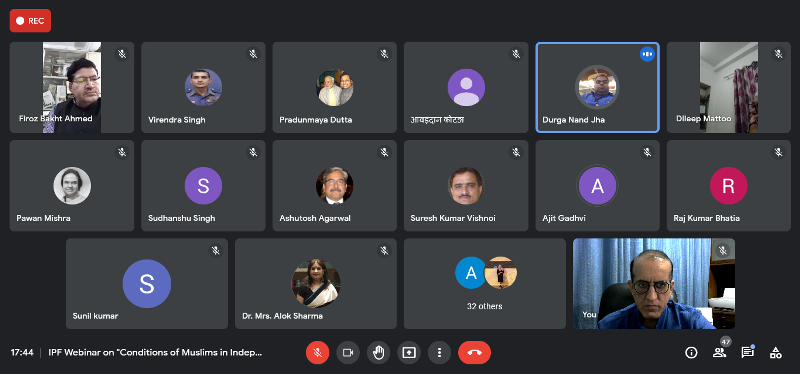
Brig Jeewan Rajpurohit: The first point I want to make is either we are Indians or we are religious based citizens. If we are Indians, then it includes both majority and minority. Development, politics and history are the same for everyone. But when it comes to progress, then there are many schemes of the government that is applicable to all. Every community and every community leader are part of our society. If you are poor, then development is your right. But you cannot bring religion into it. We should try and create a concentric circle instead of communities going in diverse directions which is not in the interests of the nation. We should help each other and work for the development of the nation.
Virendra Singh: The government schemes are the same for every community and this has been the case for years. If you see the Jain and Sikh societies, they are able to make an impact on society because of the level of development that they have achieved on their own. If we take the case of Hindu society, then the government schemes have not been implemented uniformly. Look at the case of the law that abolished Sati in 1829. It took another 100 years for this law to be implemented fully. One of the biggest factors needed for the development of society is for the intellectuals to come forward and put forth demands for development. It is important for the intellectuals from the Muslim community to come forward and voice their opinions.
Lekshmi Parameswaran: My question is to Jha sir. You have mentioned in your report that Muslim community suffers from the inclusion-exclusion paradox when it comes to development. Can you throw more light on this?
Durganand Jha: Muslim community wants to remain exclusive when it comes to many things. For example, they believe that they should have a separate set of civil laws with no governmental interference in it. But when it comes to development, they want to be as inclusive as any other community. This is a paradox. It is not simply possible to be excluded and included at the same time. If you remain excluded, then you will be excluded from development altogether. We have been talking about how the backwardness of women is a major reason for the backwardness of the community. Yet, when laws were made to abolish triple talaq, there was a lot of hue and cry that was raised. How can development take place without empowering the women? This is the inclusion-exclusion paradox I had referred to.
Sushil Pandit: I am referring to a book, “Population of India in the New Millennium: Census of 2001” written by a demographer Mahendra Premi. The book has stated that at least in six states, the literacy levels of Muslims are more than the majority community. In Gujarat, the male literacy is 83 per cent among males while among Hindus, it is 79 per cent. So, the claim that was made here that there is institutional discrimination in Gujarat because of which Muslims are not given opportunities and they remain backward is not proven at least by data.
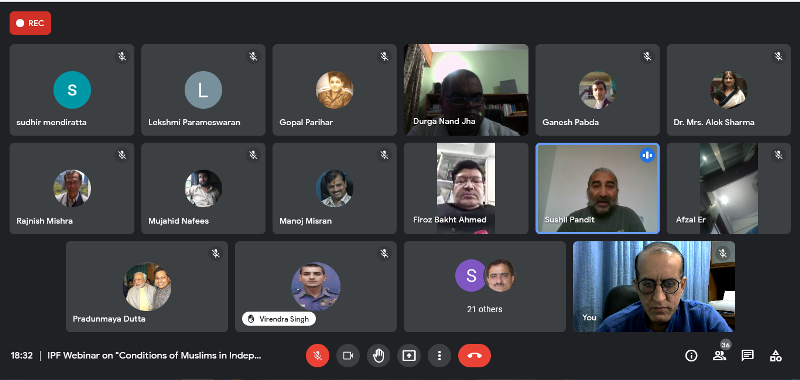
Dr Ratnoo: These figures might also be because the enrolment in Madrassas is also taken into account. And also, governments always work on pressure and demands. It is possible that in some areas, there were no demands that were being raised for schools. As stated by Durganandji, the inclusion and exclusion are not in sync. It is contradiction when demands are made for religious educational institutions as well asfor similar kind of job opportunities that are available for someone coming from the formal education sector at the same time. It is an important issue and the society needs to understand it.
Sushil Pandit: In Kerala, society is fairly well developed in terms of education as well as literacy. There, the women workforce from the non-Muslim community is very visible and, in some areas, there is dominance and virtual monopoly. For example, in the nursing field Malayali nurses are acknowledged for their professional skills and availability. But if you look at the proportion of Muslim women in this, it is insignificant. Which means, the religious identity trumps the ethnic identity of Malayali women.We need to introspect why is the religious identity important in place where there is better literacy, education and common ethnicity? Which mindset, value system and priority order do these reflect? It needs to be pondered over.
Dr Alok Sharma: When we worked on the issue of triple talaq for IPF, we realised that it is important for voices to come from within thecommunity, especially that of women. The community should come forward and ensure equal rights. Even though now, students from Madrassas are allowed to sit in the 10th boards, they still lack the foundation. Today from fifth standard, there are a lot of courses that are being introduced, it becomes very difficult to cope up with this later. The community should come forward and work towards development.
Sanjiv Kumar Pandey: I have a school in Samastipur and my first student happened to be a Muslim. The community has played a huge role in the development of my school. I have a friend, Mohammed Akhlaq who is an industrialist based in Samastipur. Another friend Mois Khan runs a Madrassa. One friend is focussed on science and technology and another is focussed on religion. There is a complete difference in their thinking. I believe that the Muslim community needs to change its mindset and put their focus on education and development. There should be openness and we should welcome science and technology.
Durganand Jha: The research is already out that in communities where there is more religiosity,the development will be less. In Muslims, there is also a huge impact of clergy. Often these clerics are from Madrassas and their entire education is religious education. They are less educated and come from the lower section of society. So, when a society is guided by those who have had very little exposure to development, then how can such a society progress?
Dr Ratnoo:
We have had a good discussion but still there are a lot of topics that need to be covered. I am from Jodhpur, Rajasthan. There is a Maulana Azad private university and I had a discussion with its secretary regarding the work they are doing. They have schools, colleges and also give special attention to the education of girls. I asked him about the unemployment rate of the Muslim students. The answer that he gave surprised me. He said the unemployment rate among Muslims is zero as they emphasise on skill development from a very young age. Muslim children are taught one vocation or the other. He said the opportunities for higher education are given to meritorious students but every Muslimwith or without higher education find employment in the informal sector. Even now, we can see that in many of the jobs that require skills like carpentry, tailoring, plumbing, electrical works etc., there is huge participation of Muslims and they are doing well. Most of them are self-reliant from a very young age.
There is also a belief within the community that government jobs are hard to get, so it is better to teach younger generations a skill so that they can start earning soon. They are not opting for higher education and prefer doing something on their own. The Muslim community has made a huge contribution in the fields of art, music and handicrafts. They find their socio-economic security there. I feel that when talking about development, we need to consider the income of a family. When we are considering a family of 10 people, then their accommodation expenditure is reduced and the expenses for food also get divided. So, when we look at the family income, it is possible that Muslims are not as backward as they are thought to be. Even in nutrition, nobody has said the Muslim is community is behind the scheduled castes and scheduled tribes. The one area where there is backwardness is higher education and the participation of Muslim women in formal workforce. The opportunities for informal employment will also be less for Muslim women in cities due to urbanisation. There are many such factors that the Muslim community needs to understand and take up.
The religious expectations become a hurdle for you as a citizen and as a human being to focus on educational, professional and personal development. There is a pressure to first strengthen the religious identity because of which socio-economic identity takes a backseat. The intellectuals of the Muslim community should introspect how the Parsis, Jains and Sikhs achieved the phenomenal levels of economic development even when there were no special privileges given to them. These communities gave enough opportunities for women and brought them to the forefront.
The situation of Muslims in the country has drastically improved in the last 30-40 years. The budget of the Minority Affairs Ministry has increased in the last few years and now many scholarships and fellowships are awarded to those from the Muslim community. The participation of Muslim men and women has also increased in the government jobs. A number of them are becoming lawyers, judges, bureaucrats, police officers etc. People are achieving their goals without any discrimination and through merit. We need to keep religion as a private affair and start concentrating on socio-economic development. The government should keep the conversation going with the intellectuals and industrialists of the community. More participation of women should be ensured.
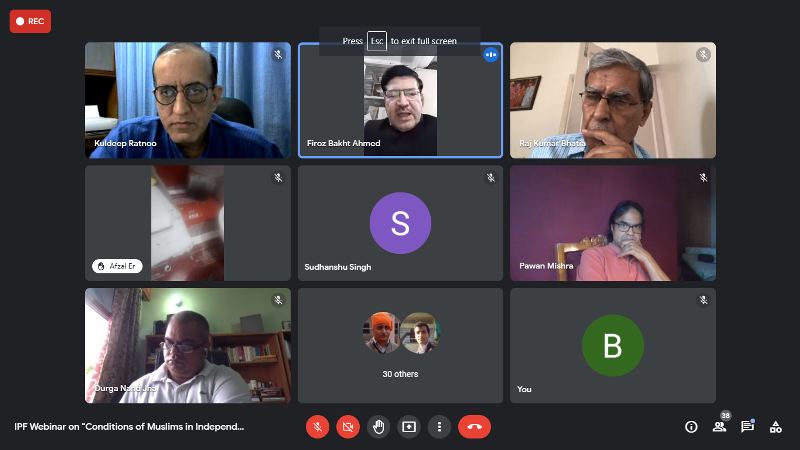
However, I believe that it is not good to be overtly obsessed with government jobs. Such expectations can become a major reason for unemployment. Those who have talent and are meritorious should continue their efforts to gain good jobs in the fields that they excel in.
We had a good discussion today. Unfortunately, due to some technical issues, we could not listen to Er. Mohammad Afzal, and also Shri Firoz Bhakht in the later part of the discussion.Connectivity issues are not in our control. I thank everyone for listening to the discussion patiently. Social development is a continuous process and we will keeporganising such discussions. Thank you very much again for your active participation and patient hearing!